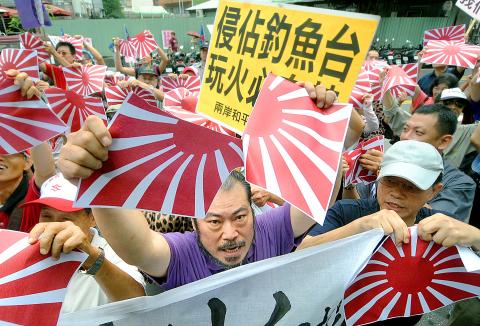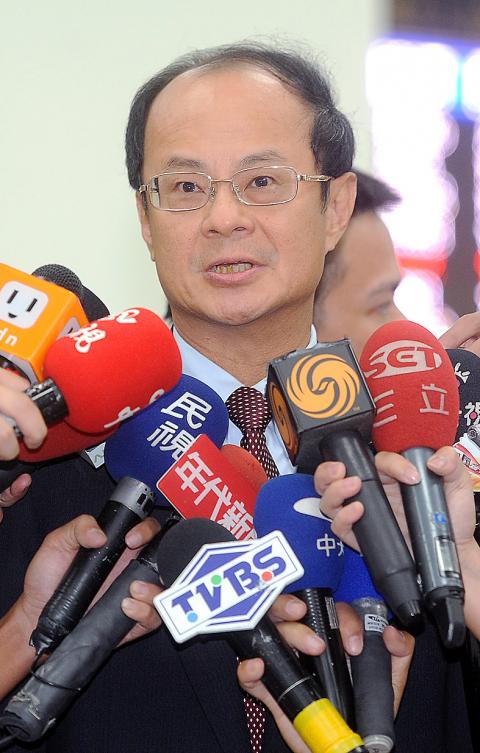More than 70 activists gathered outside Japan’s representative office in Taipei yesterday tore up Japanese rising sun flags in a protest against the country’s move to buy three of the disputed Diaoyutai Islands (釣魚台), known as the Senkakus in Japan, from their private owner.
The activists, including members of the Taiwan Labor Party, said that Japan’s move to purchase and nationalize the islands, part of a chain that is also claimed by Taiwan and China, has undermined stability in the Asia-Pacific region.
Demanding that Japan stop what they described as the “illegal occupation” of the uninhabited islands, the demonstrators chanted slogans and threw shreds of the torn-up Japanese flags at the Taipei office of the Interchange Association, Japan, Tokyo’s de facto embassy in Taiwan in the absence of official diplomatic ties.

Photo: Fang Pin-chao, Taipei Times
Office personnel accepted a protest letter from the demonstrators after the 30-minute rally and promised to forward it to their superiors.
Meanwhile, the Coast Guard Administration said it would continue its regular missions to protect Taiwanese fishermen operating in waters near the islands and that it does not rule out increasing the number of boats patrolling the area when Taiwanese activists head to the islands to make sovereignty claims.
The remarks came in response to reports that fishermen’s associations have vowed to dispatch more than 100 vessels to the islands if the government plans any activities in the region to bolster Taiwan’s claim.

Photo: Liu Hsin-de, Taipei Times
Although the Diaoyutais fall within a “provisional enforcement line” tentatively agreed upon by Japan and Taiwan, Japanese patrol ships tend to harass or disperse Taiwanese fishing boats if they are within 12 nautical miles (22km) of the islands.
The Suao Fishermen’s Association said yesterday that the operations of Taiwanese fishing vessels are not affected as long as they stay at least 12 nautical miles from the archipelago.
Association director Lin Yueh-ying (林月英) said that, so far, she had not heard of any plans by fishermen to sail to the disputed area to protest or make territorial claims.
Meanwhile, Taiwan’s APEC envoy Lien Chan (連戰) yesterday said he had called on Japanese Prime Minister Yoshihiko Noda to handle the dispute over the Diaoyutais in accordance with international laws and to resolve the issue peacefully.
Lien and Noda met on Saturday on the sidelines of an APEC leaders’ forum and exchanged ideas on issues including economic cooperation, negotiations on fishing rights and cooperation in the fishing industry.
While Noda proposed to strengthen efforts to push forward cooperation in the fishing industry, Lien called on Japan to exercise self-restraint when handling territorial disputes in the East China Sea.
In the wake of Japan’s move to nationalize some of the disputed Diaoyutai Islands, the Ministry of Foreign Affairs recalled Taiwan’s representative to Japan Shen Ssu-tsun (沈斯淳).
Shen returned to Taiwan yesterday to brief the ministry on the latest developments.

PREPAREDNESS: Given the difficulty of importing ammunition during wartime, the Ministry of National Defense said it would prioritize ‘coproduction’ partnerships A newly formed unit of the Marine Corps tasked with land-based security operations has recently replaced its aging, domestically produced rifles with more advanced, US-made M4A1 rifles, a source said yesterday. The unnamed source familiar with the matter said the First Security Battalion of the Marine Corps’ Air Defense and Base Guard Group has replaced its older T65K2 rifles, which have been in service since the late 1980s, with the newly received M4A1s. The source did not say exactly when the upgrade took place or how many M4A1s were issued to the battalion. The confirmation came after Chinese-language media reported

The Taiwanese passport ranked 33rd in a global listing of passports by convenience this month, rising three places from last month’s ranking, but matching its position in January last year. The Henley Passport Index, an international ranking of passports by the number of designations its holder can travel to without a visa, showed that the Taiwan passport enables holders to travel to 139 countries and territories without a visa. Singapore’s passport was ranked the most powerful with visa-free access to 192 destinations out of 227, according to the index published on Tuesday by UK-based migration investment consultancy firm Henley and Partners. Japan’s and

A Ministry of Foreign Affairs official yesterday said that a delegation that visited China for an APEC meeting did not receive any kind of treatment that downgraded Taiwan’s sovereignty. Department of International Organizations Director-General Jonathan Sun (孫儉元) said that he and a group of ministry officials visited Shenzhen, China, to attend the APEC Informal Senior Officials’ Meeting last month. The trip went “smoothly and safely” for all Taiwanese delegates, as the Chinese side arranged the trip in accordance with long-standing practices, Sun said at the ministry’s weekly briefing. The Taiwanese group did not encounter any political suppression, he said. Sun made the remarks when

BROAD AGREEMENT: The two are nearing a trade deal to reduce Taiwan’s tariff to 15% and a commitment for TSMC to build five more fabs, a ‘New York Times’ report said Taiwan and the US have reached a broad consensus on a trade deal, the Executive Yuan’s Office of Trade Negotiations said yesterday, after a report said that Washington is set to reduce Taiwan’s tariff rate to 15 percent. The New York Times on Monday reported that the two nations are nearing a trade deal to reduce Taiwan’s tariff rate to 15 percent and commit Taiwan Semiconductor Manufacturing Co (TSMC, 台積電) to building at least five more facilities in the US. “The agreement, which has been under negotiation for months, is being legally scrubbed and could be announced this month,” the paper said,